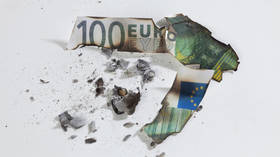IMF and World Bank sound alarm over recession

The world’s economy may plunge into a recession next year as central banks raise interest rates to battle inflation but are stalling growth in the process, according to World Bank President David Malpass and IMF head Kristalina Georgieva. The two spoke at a joint virtual discussion on Monday.
“There's a risk and real danger of a world recession next year,” Malpass stated, noting that slowing growth in advanced economies and currency depreciation in many developing countries are signaling a deterioration of the global economy.
“Development efforts are facing a crisis amid a vast array of problems,” he added.
Georgieva agreed that “the risk of recession has increased,” noting that countries that jointly account for a third of the world’s GDP are at the risk of falling into a recession. These nations may experience negative growth during the last quarter of 2022 and the first quarter of 2023, she added.
According to IMF estimates, global losses from the economic slowdown may reach as much as $4 trillion by 2026, which is equivalent to the size of Germany’s GDP. Nevertheless, Georgieva said that policymakers can’t let inflation become a “runaway train” without taking measures to tame it.
Many central banks have hiked interest rates this year in an attempt to battle with tighter monetary policy the inflation sparked by rising energy costs and the legacy of pandemic-era loose monetary and fiscal policies. The European Central Bank hiked its benchmark rate by an unprecedented 75 basis points last month, following a 50 basis-point hike in July, the first in over a decade. The US Federal Reserve has delivered several rate hikes, while the Bank of England announced the steepest interest rate hike in over 20 years in August, upping its benchmark rate by half a percentage point to 1.75% in what was its sixth rate rise since December.
For more stories on economy & finance visit RT's business section














